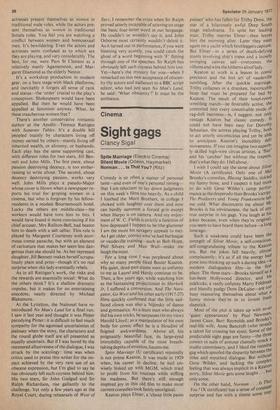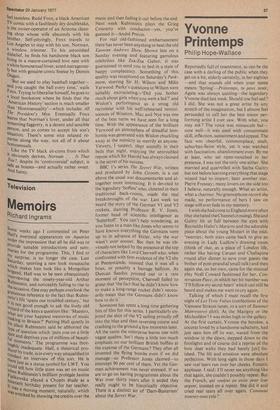Cinema
Sight gags
Clancy Sigal
Spite Marriage (Electric Cinema) Silent Movie (Odeon, Haymarket) Norman ... Is That You? (Ritz)
Comedy is so often a matter of personal taste—and even of one's personal timing-that 1 am reluctant to lay down judgments on this week's films too heavily. As a child I loathed the Marx Brothers, in college 1 choked with laughter over them and now can hardly summon a forced grin except when Harpo is on camera. And my enjoyment of W. C. Fields is strictly a function of how depressed I happen to be (the glummer I am the more his savagery appeals to me). As I get older, comics who've had burlesque or vaudeville training—such as Bob Hope, Phil Silvers and Max Wall—make me laugh the most.
For a long time I was perplexed about why so many people liked Buster Keaton. His quiet, dead-pan stunts were as unfunny to me as Laurel and Hardy continue to be. Then, a few years ago, while watching him as the fantasising projectionist in Sherlock Jr, I suffered a conversion. And The Navigator,Go West and his other early (1917-27) films quickly confirmed that the little sadfaced clown was also a Nijinsky of dance and gymnastics. As a stunt man who always did his own tricks, he surpasses (in my view) Harold Lloyd; as a manipulator of his own body for comic effect he is a Houdini of feigned awkwardness. Above all, his poignantly beautiful face, its large-eyed immobility capable of the most breathtaking depths of emotion, haunts me.
Spite Marriage (U certificate) reputedly is not prime Keaton. It was made in 1929 when, his career in decline, he had unwisely linked up with MGM, which tried to profit from his routines while stifling his madness. But there's still enough inspired joy in this old film to make most current comedies look feebly unoriginal.
Keaton plays Elmer, a 'cheap little pants presser' who has fallen for Trilby Drew, the star of a hilariously awful Deep South stage melodrama. To spite her leading man, Trilby marries Elmer—then leaves him the morning after. Later they meet again on a yacht which bootleggers capture. But Elmer—in a series of death-defying stunts involving ship's ropes and a looselY swinging canvas sail—overcomes the villains and wins the hitherto aloof lady.
Keaton at work is a lesson in comic precision and the lost art of vaudeville tumbling. After the quickie marriage, Trilby collapses in a drunken, inextricable heap but must be prepared for bed bY Keaton. The result of their hotel-room wrestling match--he feverishly active, she contorted into every conceivable mode of rag-doll inertness—is. I suggest, not onlY vintage Keaton but classic comedy. Ir could not have been easy for DorothY Sebastian, the actress playing Trilby, both to act utterly unconscious and yet be able to anticipate Keaton's incredibly deft movements. If you can imagine two superb: ly skilled high-wire circus artistes, a 'flier and his 'catcher' but without the trapeze, that's what they do. I fell about.
I wish I could say the same about Silent Movie (A certificate). Only one of Mel Brooks's comedies, Blazing Saddles, tickled my funny bone, and I suspect it had more to do with Gene Wilder's camp performance as the desperado than Brooks's scriPt. The Producers and Young Frankenstein left me cold. What disconcerts me about Mr Brooks is his obviousness, the lack of anY true surprise in his gags. You laugh at his jokes because, even when they're original, you seem to have heard them before—a long time ago. Such a weakness could have been the strength of Silent Movie, a self-conscious' self-congratulating tribute to the Keaton era. But the jokes fall heavily, almost complacently; it's as if all the energy had gone into thinking up such a daring idea—a modern dialogueless film—in the first place. The three stars—Brooks himself as .3 has-been Hollywood director, and his sidekicks, a vastly unfunny Marty Feldman and blandly pudgy Dom DeLuise—are to° busy reassuring themselves about what a funny movie they're in to invent fresh slapstick. Most of the plot is taken up with so's° 'guest appearances' by Paul Newlnall' James Caan, Burt Reynolds and Brooks real-life wife, Anne Bancroft (who reveals a talent for crossing her eyes). Some of the predictable sight gags are funny—the three comics in suits of armour clumsily wreck 3
studio commissary, and I liked the running the gag which spoofed the disparity between
titles and mouthed dialogue. But without Gene Wilder, and lacking the coMPle'c feeling that was always implicit in a Keat°rIt story, Silent Movie gets some laughs
only some.
On the other hand, Norman . . You ?(X certificate) has a sense of constaln surprise and fun with a theme some inaY feel tasteless. Redd Foxx, a black American TV comic with a faultlessly dry doubletake, IS the owner-operator of an Arizona cleaning shop whose wife absconds with his brother. Self-pityingly, Foxx travels to Los Angeles to stay with his son, Norman, a. window trimmer. To his astonished disbelief, he finds his handsome black son living in a mauve-curtained love nest with a white homosexual lover, acted outrageously but with genuine comic finesse by Dennis Dugan.
'But we used to play baseball together— and you caught the ball every time,' wails Foxx. Trying to liberalise himself, he goes to
local bookstore where he finds that the American History' section is much smaller than 'Homosexuality'--which includes All The President's Men. Eventually Foxx learns that Norman's lover, under all that screaming faggotry, is a decent and sensible Person, and so comes to accept his son's situation. There's some nice relaxed rePartee along the way, not all of it about homosexuals.
Like the TV black sit-corns from which It Obviously derives, Norman . . . Is That You?, despite its 'controversial' subject, is safe as houses—and actually rather sweet. And funny.











































 Previous page
Previous page